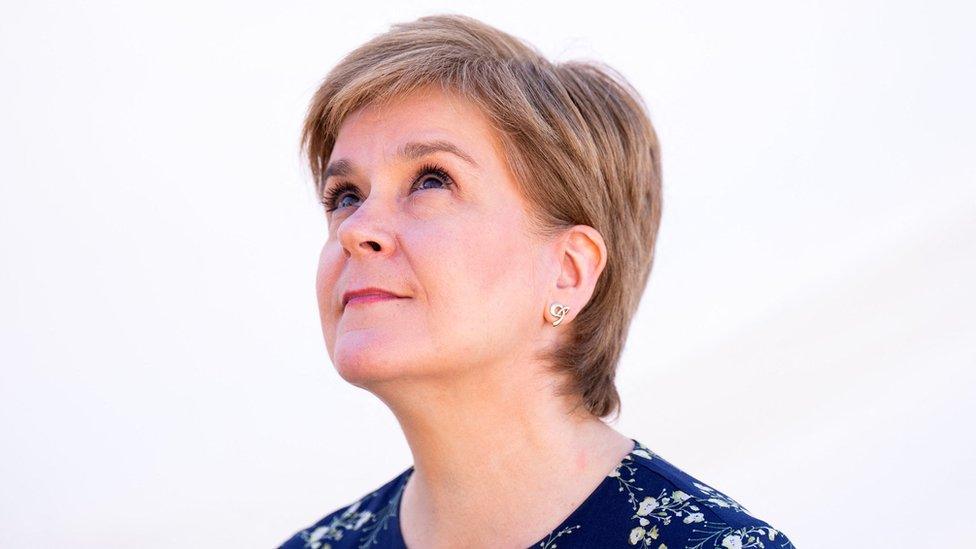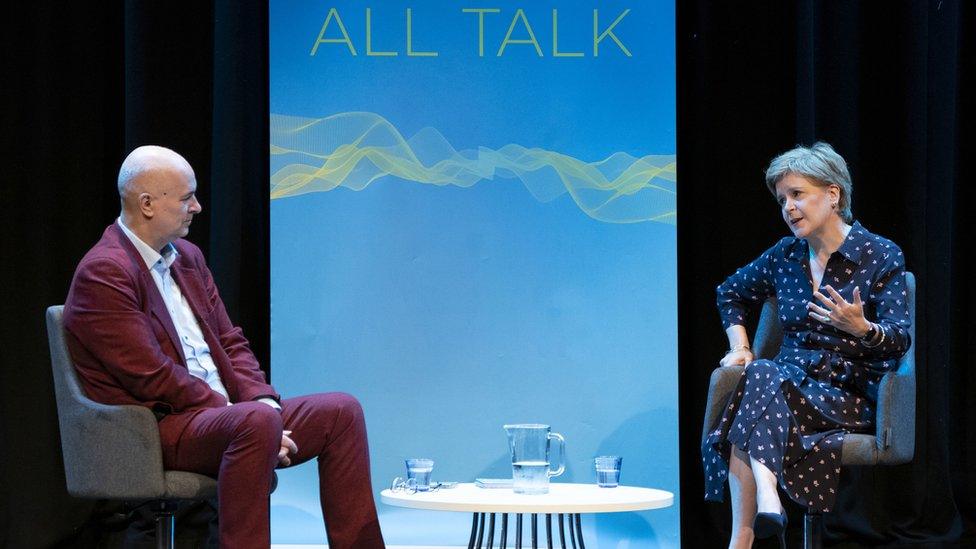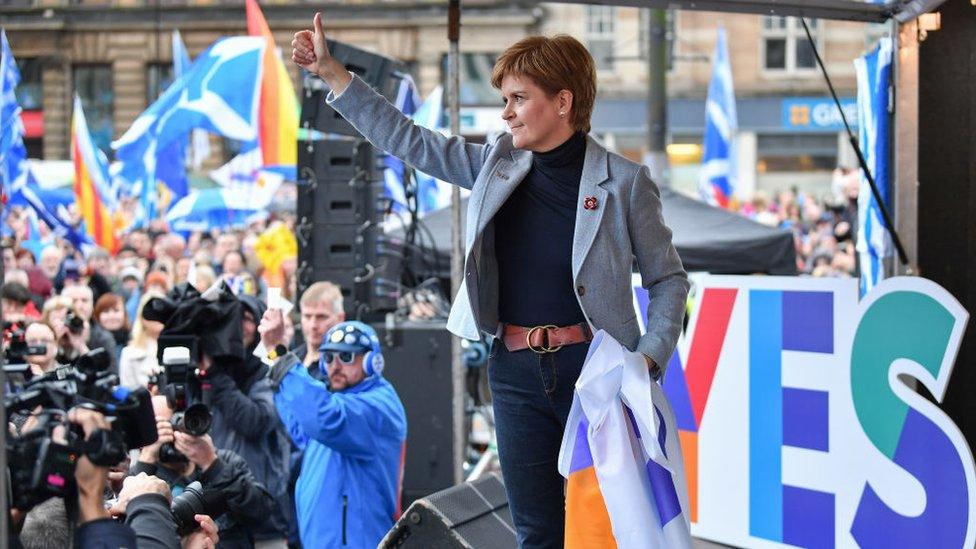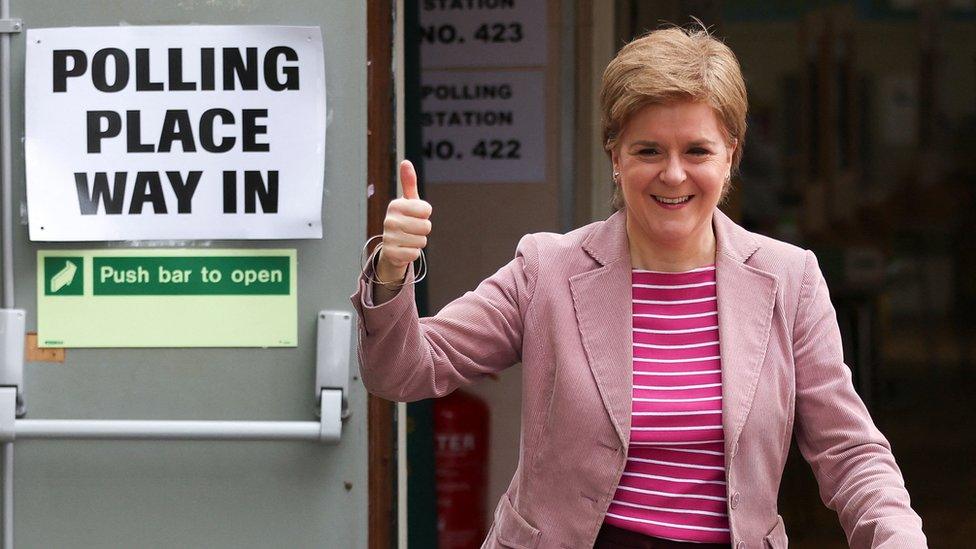Is indyref2 showdown Nicola Sturgeon's last stand?
- Published

Nicola Sturgeon's future is again the subject of speculation after the first minister said during an Edinburgh Fringe interview that she had not yet decided whether she would lead the SNP into the next Scottish Parliament election.
She also stated clearly that she is "up for the challenge" and is looking forward to a fresh independence referendum - but with her cards on the table about that vote, we may be already at the point where we can map out what her future looks like.
It is inextricably linked to the issue of independence - and how that plays out is likely to be the defining act of her career.

Why has this come up again?
First of all, if Nicola Sturgeon is reading this, I imagine she is already rolling her eyes.
Her latest comments were made during a fairly light-hearted Edinburgh Festival interview with broadcaster Iain Dale and she was very careful to caveat them.
She lamented that there isn't a space for leaders to answer questions about the future in a "more human" way without it being spun as a cast-iron declaration about their impending departure.

Ms Sturgeon's latest comments came during an interview with the broadcaster Iain Dale at the Edinburgh Festival
The first minister said the "default" position was that she would continue, but that every politician should have the self-reflection and awareness to know that things could look very different a few years down the line.
That is fair, and Ms Sturgeon was clearly at pains not to send any specific signal in this interview.
But she has already put her various plans for a referendum on the table, so the possible endgames - in triumph or defeat - have come more into focus.
Post-referendum retirement
Nicola Sturgeon's dream scenario is that she wins a referendum and becomes the first leader of a newly independent Scotland, achieving her life's ambition before eventually handing over to a successor.
Her nightmare would be that Scots opt to reject independence for a second time, and she goes the way of Alex Salmond. Ms Sturgeon has been clear that she would "make way" in the aftermath of such a defeat, and leave decisions about the next steps to others.
Both of these outcomes rely on a referendum actually being delivered during this parliamentary term, with both sides participating whole-heartedly.

Nicola Sturgeon wants to hold a referendum in October 2023
That is unlikely to come via the "gold standard" 2014-style deal Ms Sturgeon still desperately wants with Downing Street.
The Supreme Court hearing in October could force the issue, but a political accord would still be necessary for a vote with the international recognition needed to propel Scotland out of the UK and back into the EU.
If judges back the right of MSPs to set up a referendum, that might box the prime minister - whoever that may be - into a corner and force them to engage.
Equally, Ms Sturgeon would seek to use a court defeat to illustrate why more powers are needed at Holyrood, targeting a win in the court of public opinion.
But most people you talk to in Scottish politics privately acknowledge that a 2023 referendum is probably a long shot. Which is why Ms Sturgeon has also set out her backup plan.
General election gamble
If Plan A is an agreed referendum and Plan B is securing that through the courts, then the remaining option is Plan C: what she calls a "de-facto referendum" where the SNP fight the next general election on the single issue of independence.
This would involve targeting more than 50% of the Scottish vote - an incredibly high bar to cross, which the SNP fell short of even in its 2015 mega-landslide and which hasn't been achieved by a single party since the Conservatives in 1955.
There are many practical questions about this approach, which Ms Sturgeon dismissed as a "unionist trap", external when it was suggested by restless elements of her party in the past.

How many more elections does Nicola Sturgeon want to contest?
How could the SNP unilaterally turn a UK-wide election, which Labour and the Conservatives would be contesting entirely for control of Downing Street, into single-issue vote that could actually deliver independence with all of the legitimacy and international recognition required?
Other pro-independence parties like the Greens want to take part too, although they presumably couldn't use an identical one-line manifesto. Would Alba be part of the alliance, given Ms Sturgeon has suggested that she will never talk to Alex Salmond again?
Of course, the questions are not just for the pro-independence side. Ms Sturgeon would turn the issue back on supporters of the union - how can this be the only option left open to settle the issue?
Anyway, if she goes ahead with the de-facto referendum, there are again two possible outcomes.
Victory - which would see the first minister march to Downing Street to demand independence with a majority of the electorate behind her, triggering political fireworks if nothing else - or defeat, which would see her resign.
An early departure
The other option - the one Ms Sturgeon's opponents have been hyping - is that she chooses to go sooner rather than later.
She is correct that this is at least in part wishful thinking on their part, given the succession of drubbings she has handed them at the ballot box.
But it might also be a recognition of the difficulty of the remaining paths left open.
Ms Sturgeon has not built a reputation as a gambler. The de-facto poll idea seems somewhat out of character, if viewed as a real prospect rather than a tool to force UK ministers into backing a more recognised process.
Sturgeon: I'm going to be around a lot longer
It might be the case that October 2023 comes and goes, and with a general election potentially not following until early 2025, Ms Sturgeon decides that the crucial call about what comes next for the independence movement is for a new leader.
In a way that would be a bit out of character too. The SNP leader famously keeps her decision-making circle small, and her party has done very little in the way of succession planning.
There are few up-and-coming ministers who are seriously viewed as a future first minister. With Kate Forbes away on maternity leave, the party is currently being run by the same faces - Ms Sturgeon, John Swinney, Ian Blackford, Angus Robertson, Mike Russell - who were there in the 1990s.
Given her penchant for careful planning and foresight, this seems like a deeply imperfect solution too.
Fighting another Holyrood election
The scenarios described above have one thing in common: they all play out before 2026. None would require Ms Sturgeon to contest another election to a devolved Scottish Parliament.
This is the real reason why there is such uncertainty over this particular question. By 2026, the drama will likely have concluded, and the key questions will have been settled.
That is not to say the issue of independence will definitely have been thrashed out once and for all, but we will know whether the plans laid out by Ms Sturgeon have borne fruit or flopped.
Perhaps, to play out another hypothetical scenario, she could use another Holyrood race to secure a fresh mandate to put pressure on Prime Minister Starmer - in the hope it would have more of an impact than similar mandates had on his predecessors.
On the flip side, the Conservatives holding on to power at Westminster might be a win on the campaigning front, but as we have seen during the Johnson era, absolutely no guarantee of actually delivering a vote or independence.
And if Ms Sturgeon really does have plans for a life after politics - she is still only 52 - she isn't going to want to keep rehashing the same strategies over and over.
That's to say nothing of the difficulties of governing during the coming years, with departments already facing real-terms cuts, a recession looming and voters hunkering down for a cost of living crisis.
All of this explains why the first minster is reluctant to say she will definitely lead the SNP into the next Holyrood election. It's because the decision will likely be effectively made for her by the events of the intervening years.